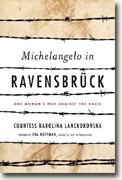Michelangelo in Ravensbruck
Karolina Lanckoronska
book reviews:
· general fiction
· chick lit/romance
· sci-fi/fantasy
· graphic novels
· nonfiction
· audio books
· author interviews
· children's books @
curledupkids.com
· DVD reviews @
curledupdvd.com
newsletter
win books
buy online
links
home
for authors
& publishers
for reviewers

 |
Michelangelo in Ravensbruck: One Woman's War Against the Nazis Karolina Lanckoronska, tr. Noel Clark Perseus Hardcover 341 pages April 2007 |
|
Karolina Lanckoroñska was an aristocrat, member of an elite Polish family, but she never let her class heritage prevent her from doing the right thing. During World War I, the teenaged Karolina nursed wounded soldiers. After the invasion of Poland at the start of World War II, Karolina, then a professor of classical art, did not emigrate as she could have, but chose instead to work in the resistance movement. She was appointed head of a governmental organization responsible for providing food to Polish prisoners. Visiting nearly every jail in Poland, she not only got food packages from desperate relatives to the incarcerated but created and reinforced communication lines within the underground. It wasn’t long before she was arrested.
Fiercely loyal to her compatriots, the countess refused special privileges at the camp. Her lengthy firsthand descriptions of the horrors of camp existence in Michelangelo in Ravensbrück Into this chaos, Karolina brought books. She taught life-affirming classes about Shakespeare and Michelangelo. Karolina felt that both she and her pupils were enriched by these encounters with classical art, in the face of “pre-mortal fear.” Karolina recorded that in her own most dreadful moments, she could still recall comforting visions of great works of art she had seen as a child. The first Pole released from Ravensbrück, Karolina walked backward out the gate “for a last sight…of my sisters in the early morning sunshine.” She never returned to her country. From Rome, this brilliant, passionate woman spearheaded the expatriate preservation of Polish culture and sought justice against Hans Kruger, who received multiple life sentences for his murders of Poles and Jews. The countess’s book was long-neglected, considered too anti-German or too anti-Soviet, depending on the political fashion of the times. Now it has been resurrected by Da Capo Press with a release date to coincide with the day Karolina left Ravensbrück. Originally published on Curled Up With A Good Book at www.curledup.com. © Barbara Bamberger Scott, 2007 |
|
|
|
 Click here to learn more about this month's sponsor! |
|
| fiction · sf/f · comic books · nonfiction · audio newsletter · free book contest · buy books online review index · links · · authors & publishers reviewers |
|
| site by ELBO Computing Resources, Inc. | |
 The Germans never officially established that Karolina was guilty of specific crimes, but they knew she was up to something; she was not free again until a few weeks before the end of the war. Never sure what might happen, she prepared almost daily for execution. Polish prisoners were noted for their courageous resistance to the Nazis: they stood up under torture, remaining defiant, and went to their deaths with shouting “Long live Poland!” Flamboyant Polish women slated to be shot contrived to have their hair done. Karolina was particularly annoying, with her extensive knowledge of languages, her unshakeable love of her country, her many political and royal connections, and her prodigious intellect. The infamous SS Hauptsturmführer Hans Kruger became so frustrated trying to wrest a confession from her that to taunt her, he described his murder of hundreds of Polish intellectuals, people who were still presumed “missing” by their families. When she saw a chance, Karolina related these war crimes to a sympathetic German officer who, thinking it would save her, reported them to Himmler. Had not the Italian royal family intervened, Karolina would have been executed on the strength of her assertive meddling in that one instance alone. Frustrated once again, the Nazis sent her to Ravensbrück, a women’s concentration camp.
The Germans never officially established that Karolina was guilty of specific crimes, but they knew she was up to something; she was not free again until a few weeks before the end of the war. Never sure what might happen, she prepared almost daily for execution. Polish prisoners were noted for their courageous resistance to the Nazis: they stood up under torture, remaining defiant, and went to their deaths with shouting “Long live Poland!” Flamboyant Polish women slated to be shot contrived to have their hair done. Karolina was particularly annoying, with her extensive knowledge of languages, her unshakeable love of her country, her many political and royal connections, and her prodigious intellect. The infamous SS Hauptsturmführer Hans Kruger became so frustrated trying to wrest a confession from her that to taunt her, he described his murder of hundreds of Polish intellectuals, people who were still presumed “missing” by their families. When she saw a chance, Karolina related these war crimes to a sympathetic German officer who, thinking it would save her, reported them to Himmler. Had not the Italian royal family intervened, Karolina would have been executed on the strength of her assertive meddling in that one instance alone. Frustrated once again, the Nazis sent her to Ravensbrück, a women’s concentration camp.